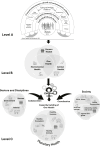The Earth as a Living Organism: Contribution of Integrative Medicine to the Healing of Our Planet (One Health)
- PMID: 39068929
- PMCID: PMC11466444
- DOI: 10.1159/000540226
The Earth as a Living Organism: Contribution of Integrative Medicine to the Healing of Our Planet (One Health)
Abstract
Background: Considering the analogies between the disruption in ecological systems and in individuals, the concept of integrative medicine is extended to the One Health concept and integrative medicine is introduced as an innovative model for guidance/correction in patients' therapy as well as in ecological realignment.
Summary: The specific elements of integrative medicine that can be applied to human health as well as to environmental health are described (e.g. self-regulation, salutogenic healing processes, transdisciplinary multimodal approaches, methodological pluralism). The need for sustainable use of limited resources in medicine and pharmacy is pointed out. As examples for urgent action, the need of taking into account the whole life cycle of pharmaceutical products as well as the impact of diet for human and planetary health are mentioned.
Key message: Self-regulation plays a crucial role in human and environmental health; sustainable promotion of self-regulation enables people to become co-creators of their own health. Such a fundamental change requires transformation of one's inner relationship to nature and to oneself. The aim of the mini-review was to concretize individual fields of action and to investigate the question of whether the concepts of integrative medicine can be transferred from humans to the environment and thus to planetary health and whether this makes sense.
<title>Hintergrund</title> Aufgrund der Analogien, die sich zwischen Störungen in ökologischen Systemen und in der menschlichen Gesundheit zeigen, wird das Konzept der Integrierten Medizin auf das One-Health-Konzept ausgeweitet und die Integrative Medizin als innovatives Modell zur Steuerung/Korrektur der Therapie von Patient*innen sowie für eine ökologische Neuausrichtung vorgestellt.<title>Zusammenfassung</title> Die spezifischen Elemente der Integrativen Medizin, die sowohl auf die menschliche Gesundheit als auch auf die Umweltgesundheit angewendet werden können, werden beschrieben (u.a. Selbstregulierung, salutogene Heilungsprozesse, transdisziplinäre multimodale Ansätze, Methodenpluralismus). Es wird auf die Notwendigkeit eines nachhaltigen Umgangs mit den begrenzten Ressourcen in Medizin und Pharmazie hingewiesen. Als Beispiele für dringenden Handlungsbedarf wird die Notwendigkeit hervorgehoben, den gesamten Lebenszyklus pharmazeutischer Produkte zu berücksichtigen, ebenso wie die Bedeutung einer Anpassung der Ernährung, nicht nur für die menschliche Gesundheit, sondern auch für die planetare Gesundheit.<title>Kernaussage</title> Die Selbstregulierung spielt eine entscheidende Rolle für die Gesundheit von Mensch und Umwelt. Eine nachhaltige Förderung der Selbstregulierung ermöglicht es den Menschen, zum Mitgestalter ihrer eigenen Gesundheit zu werden. Ein solcher grundlegender Wandel erfordert eine Transformation der inneren Beziehung zur Natur und zu sich selbst. Ziel des Mini-Reviews ist es, einzelne Handlungsfelder zu Konkretisieren und der Frage nachzugehen, ob die Konzepte der integrativen Medizin vom Menschen auf die Umwelt und damit zu einer planetarischen Gesundheit übertragbar und zielführend sind?
Keywords: Environment; Nachhaltigkeit; Planetare Gesundheit; Planetary health; Selbstregulation; Self-regulation; Sustainability; Transformation; Umwelt.
© 2024 The Author(s). Published by S. Karger AG, Basel.
Conflict of interest statement
The authors have no conflicts of interest to declare.
Figures

References
-
- Woods A, Bresalier M. One health, many histories. Vet Rec. 2014;174(26):650–4. - PubMed
-
- Evans BR, Leighton FA. A history of one health. Rev Sci Tech. 2014;33(2):413–20. - PubMed
-
- Villanueva-Cabezas J. One health: a brief appraisal of the Tripartite–UNEP definition. Transboundary and Emerging Diseases. 2022. - PubMed
-
- Rosa H. Resonance: a sociology of our relationship to the world. John Wiley & Sons; 2019.
-
- Sharma A, Patel R. Environmental degradation and its societal consequences: a comprehensive study on the relationship with depression. Adv Urban Resilience Sustain City Des. 2023;15(8):14–30.
Publication types
MeSH terms
LinkOut - more resources
Full Text Sources
Research Materials

